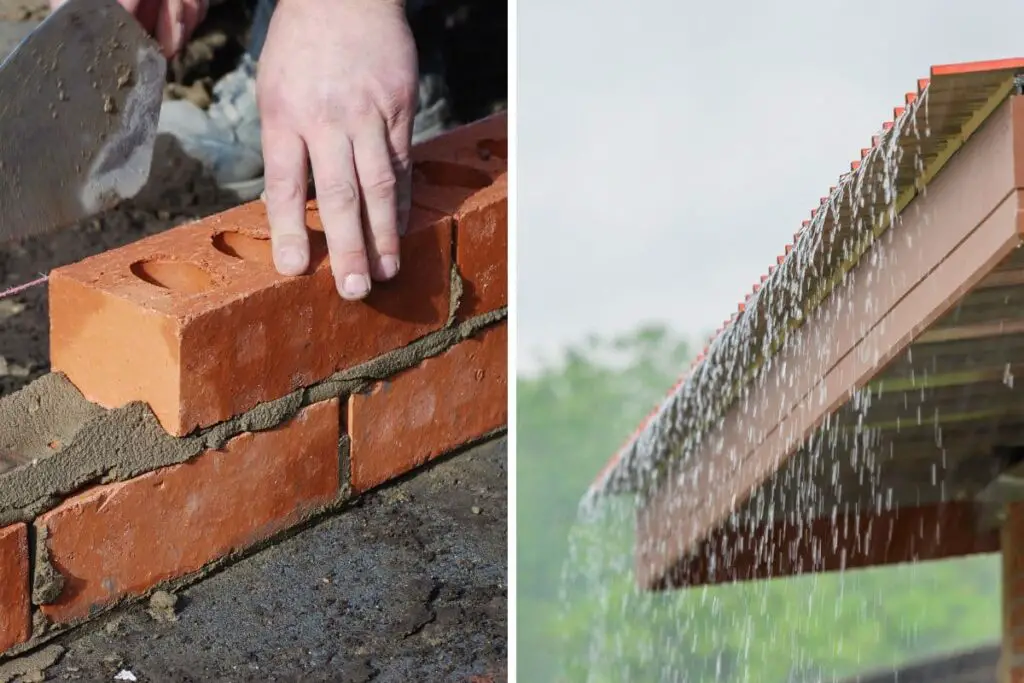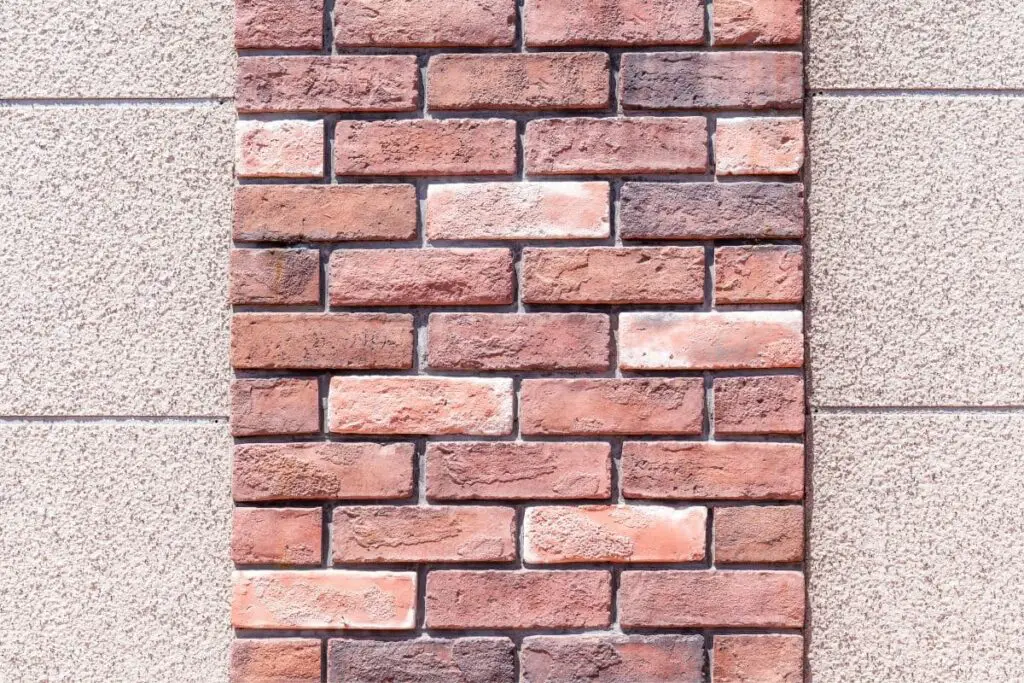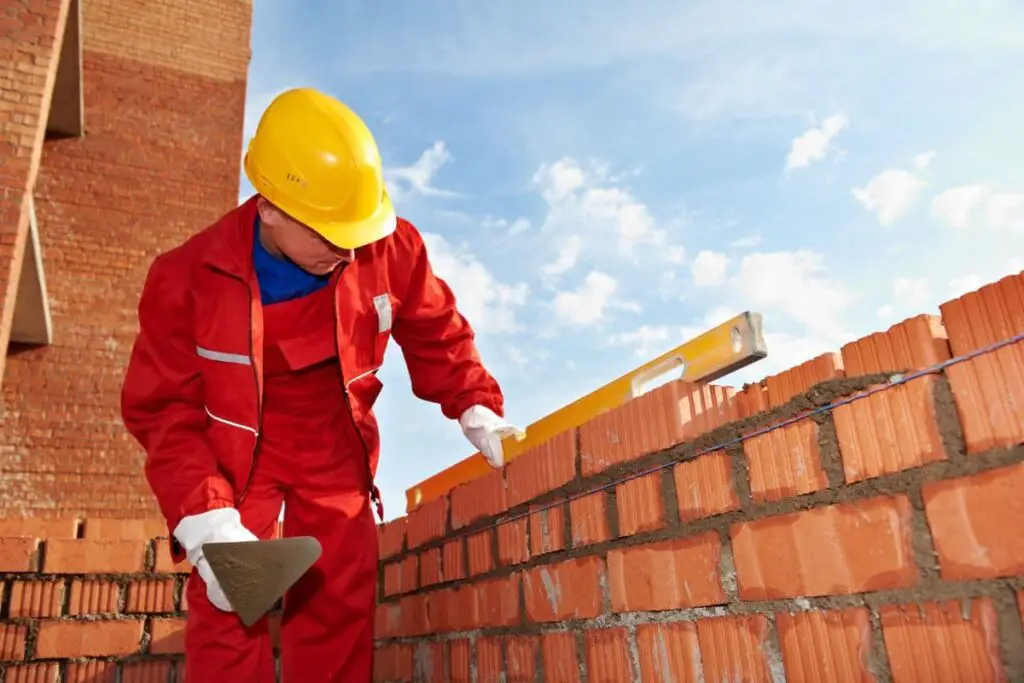As an Amazon Associate, we earn from qualifying purchases. We may also earn commissions if you purchase products from other retailers after clicking on a link from our site.
Bricklaying isn’t a simple task unless you are a pro with years of experience. Even professional bricklayers deal with a few typical and unexpected challenges, and that’s when the weather isn’t a spoilsport. So, you may wonder if you can lay bricks in the rain, be it a forecast or a surprise.
You shouldn’t lay bricks in the rain because of cement efflorescence, leaching, and runny mortar. You can set up a sizable tent to protect the site, but humidity and moisture will still pose a few threats to the strength and structural attributes of brick masonry.
Even if you are laying bricks indoors, high relative humidity and wind-driven rain will likely adversely affect your brickwork, including the mortar and other components, if any. Read on to know why you shouldn’t lay bricks in the rain and also the need to protect uncured brickwork.

Why You Shouldn’t Lay Bricks in the Rain
Neither brick nor cement is completely waterproof. While some bricks have a low absorbance threshold, all types of mortar have significant water content. Even bonded and cured brick and mortar have varying levels of porosity. Laying fresh bricks and mortar in the rain is a non-starter.
That said, you may be familiar with wetting high-absorbent bricks before laying them so that the pieces don’t absorb moisture from the mortar, which can adversely affect the curing process and subsequently compromise the strength of the bond. So, why can’t you lay bricks in the rain?
Rain Will Turn Cement Into Runny Mortar
Suppose you’re laying bricks in the open without anything protecting the site from rainwater. The first and immediate casualty will be the consistency of your cement. Rainwater will turn cement into runny mortar. You will notice mortar oozing out of the brick joints.
Also, any mixed mortar on standby will be contaminated by rainwater. You won’t be able to use the mix without restoring its composition and consistency, both of which are complicated tasks. Hence, you must not start bricklaying or move everything indoors if it suddenly begins to rain.
You shouldn’t use cement that is more diluted or moist than it should be. Else, the mortar won’t have the same bonding, curing, and strengthening effect. Watch the following video from ~4:25 to understand how runny mortar oozes out of brick joints, and this isn’t a heavy downpour:
Rain Can Cause Cement Efflorescence
You cannot lay bricks in the rain due to cement or mortar efflorescence. All types of cement and mortar mixes, including Portland, have soluble salts that will dissolve in rainwater. These soluble salts will emerge from the cement and form visible deposits on the bricks and dried mortar.
There is no way to prevent cement efflorescence other than not using any mortar mix in the rain or wherever there is significant moisture and substantially high relative humidity. Plus, bricks can have an efflorescence problem if the variety you have has soluble salts.
Not all bricks have soluble salts, but some do. The latter scenario will leave your brickwork with both brick and cement efflorescence when you work in the rain. Furthermore, freshly laid bricks and uncured cement or mortar will encounter the efflorescence problem in the rain.
You must not lay bricks in the rain and also protect the freshly laid ones with uncured mortar to prevent efflorescence. You may use a large polyethylene sheet, tarp, or a tent with waterproof material to protect the site and your brickwork. Completely cured brickwork isn’t a concern.
Moisture or Water Can Cause Leaching
Exposure to moisture, water, or rainwater, in this case, can cause leaching of the calcium ions in cement, which increases the porosity of mortar in the brick joints. Leaching will adversely affect the durability of any brick masonry you work on.

The extent of leaching depends on some variables, such as the admixtures in cement, including but not limited to the following:
- Fly ash
- Silica
- Slag
Leaching effectively defeats the primary purpose of using cement or mortar as the adhesive for bricks in any structure. Thus, you shouldn’t lay bricks in the rain, and any uncured brickwork will need to be protected from rainwater because the mortar is yet to strengthen the joints.
Rain Might Damage Uncured Brickwork
Rain is likely to damage uncured brickwork, especially mortar. The most common problems are the following:
- Brick spalling: Fragments of clay or concrete will delaminate or separate from the main structure.
- Cement deterioration: From efflorescence and leaching to runny mortar if cement is not cured or wet.
- Damaged brick masonry: Anything from lack of bonding and curing to weak structural integrity.
- Reduced stress threshold: Brick masonry won’t be as strong or sturdy as you desire.
This spalling problem may occur in the rain regardless of the material of the bricks, such as:
- Clay
- Cement
- Concrete
Thus, it is unviable to lay bricks in the rain, and you must also protect uncured bricks and mortar if there’s an unexpected downpour. Freshly laid bricks will not bond because cement won’t cure and dry as expected if the structure is exposed to rainwater.
High Humidity Might Weaken Brickwork
You cannot prevent the following problems if you lay bricks in the rain without any protection:
- Efflorescence
- Leaching
- Runny mortar
- Structural weakness
- Unpredictable curing
Also, rain will adversely impact the following attributes of brick masonry:
- Bond strength
- Compression strength
- Shear strength
Laying bricks in the rain out in the open will certainly compromise these strengths. However, an indoor project may also make laying bricks vulnerable to high relative humidity or moisture.
High relative humidity and wind-driven rain can cause the following problems in your brick masonry:
- Reduced damage and failure stress thresholds
- Poor structural integrity and, thus, a safety risk
- Uncertain durability due to weakened sturdiness
Professional bricklayers and construction workers insulate brickwork whenever necessary and protect the structure from excess moisture and rainwater, irrespective of a downpour’s severity.

Conclusion
You can’t lay bricks in the rain without impeccable protection from moisture and water. If there is any possibility of a significant spike in relative humidity or wind-driven rain, you must stop laying bricks indoors as well. The potential damage can render your entire effort and investment futile.
